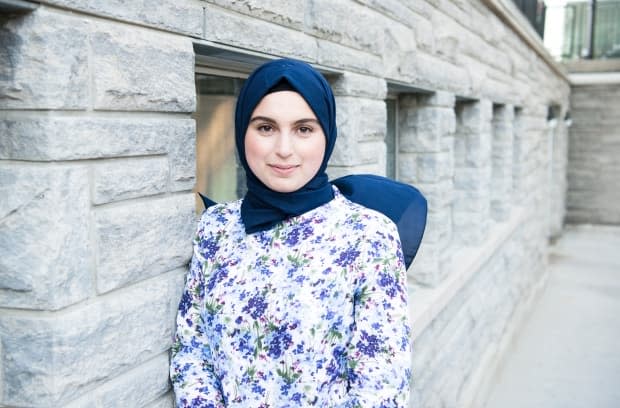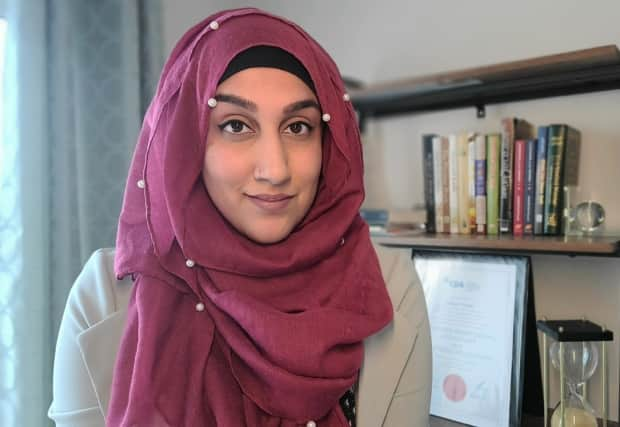London attack leaves Muslim women 'afraid to go outside'

Barâa Arar remembers her first clash with Islamophobia in Canada.
A transit driver in Kamloops, B.C., told Arar, 11 at the time, and her grandmother they couldn't ride the bus unless she removed her hijab.
"I didn't understand it at the time," said Arar, who had only started wearing the headscarf to be more like her mother.
"I was in shock. We didn't know what to do."
That shock has dissipated over time as Arar, now 24 and living in Ottawa, faced repeated harassment by strangers due to being visibly Muslim. Fear has remained.
"[Monday] was the first day in a while that I felt afraid to go outside wearing a hijab," said Arar.
Last Sunday, four members of a London family — Salman Afzaal, 46; Madiha Salman, 44; Talat Afzaal, 74; and Yumna Afzaal, 15 — died after they were struck by a truck driver. Fayez Afzaal, 9, suffered serious injuries, but survived.

Sidewalk becomes unsafe
This week, stories of fear and grief have been shared among Muslim women in Ottawa.
"The sidewalk [becomes] a place where you can be a victim of violence because of what you're wearing, because you are Muslim," said Arar.
Ottawa resident Sabeen Awan was also 11 when she says she was walking in Niagara Falls with her family as people in a car hurled Ping-Pong balls at them while driving by, simultaneously shouting expletives.
Since then, Awan has become hyper-aware whenever a vehicle approaches her.
"You're walking down the street and a car comes and instinctively, I move even further over [on the sidewalk]," said Awan, now 31.
"I kind of move my family over without saying anything, but knowing that I'm doing it just because I don't know what might happen."
We live in fear. It's real fear, and [I] feel like we're not taken seriously. - Sahada Alolo, Ottawa Muslim Women's Association
Awan said the incident in London has given her more than the usual pause.
"Is it easier if I can just blend in? I have [had] that thought," said Awan. "There's always that little fear at the back of your head. What if somebody who sees me [wearing a hijab], decides something triggers them about seeing it, and creates a reaction that I'm not expecting."
The hijab carries more importance than ever before, Awan says, and she refuses to cave in to the fear.
"I have faith that I'm doing something that I believe in and I can stand with that," she said.

Concerns need to be taken seriously
Sahada Alolo, president of the Ottawa Muslim Women's Association, says she has noticed a disturbing trend in recent years after high-profile hate crimes, such as the 2017 Quebec City mosque shooting.
"We live in fear. It's real fear, and [I] feel like we're not taken seriously," said Alolo.
This week, more Muslim women have reached out to the her concerned about leaving their homes while dressed in traditional clothing that could mark them as Muslim, such as a shalwar kameez, hijab or niqab.
"It's almost like we're talking about an invisible threat until something happens," said Alolo, who also chairs the Ottawa Police Community Council.
In an interview with Robyn Bresnahan, host of CBC Radio's Ottawa Morning, Alolo mentioned past instances when women tried to report hate crimes to police, only to be told they were "lucky" not to have been hurt.
Ottawa police say officers have stepped up patrols around local mosques in the wake of the attack in London and members met with the Ottawa Muslim Women's Association earlier this week, where they encouraged women to come forward and share their experiences.
Alolo wants police to be more proactive to protect Muslim residents, especially women.
"When you feel targeted and you report it to the police, over the years we've felt ignored. We felt that our experiences are not taken seriously," she told Bresnahan.
"As Muslims we don't have anywhere to turn to. Our experiences are not taken seriously. The hurt is real."

